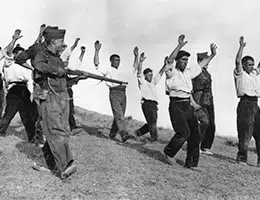 Civil , originating from the Latin word civīlis , is an adjective that can be used in various ways. The first meaning mentioned in the dictionary of the Royal Spanish Academy ( RAE ) refers to that which is linked to citizens or citizenship . For example: "With a group of neighbors we created a civil association to help the needy people in the neighborhood."
Civil , originating from the Latin word civīlis , is an adjective that can be used in various ways. The first meaning mentioned in the dictionary of the Royal Spanish Academy ( RAE ) refers to that which is linked to citizens or citizenship . For example: "With a group of neighbors we created a civil association to help the needy people in the neighborhood."
The notion is usually used to name something that is neither ecclesiastical nor military . The idea of civil aviation , in this sense, refers to air transport that is not linked to the army (that is, to military aviation). Civil marriage , for its part, is carried out by a state authority, unlike religious marriage.
Civil disobedience is a method of protest that involves not complying with a mandate imposed by the State . It is a resistance that a citizen exercises, without taking refuge in an institution, and that is practiced peacefully. A man who is summoned to fight in a war can exercise civil disobedience and not respond to the call. This type of behavior usually has some type of punishment.
Civil war , on the other hand, is called a military conflict in which two or more sides made up of citizens and not soldiers confront each other. In a conventional war, the confrontation occurs between armies .
Another way to define the civil concept is to focus on the fact that the political axes that confront each other in a warlike manner belong to the same State, the conflict takes place in the same country. This characteristic undeniably differentiates it from conventional war. In this case, the problem does not originate from a nationalist issue (although there may be a nuance of this type) but from an ideological one.
There have been examples of civil wars for many centuries and in various parts of the world. Between the years 306 and 324, for example, the civil war of the Roman Tetrarchy took place, one of the most relevant of its time, in which the division of the Empire into four territories governed by emperors took place, who fought to obtain the dominion of the territory.
 The An Lushan Rebellion , on the other hand, occurred between 755 and 763 in China, where a group of rebels fought for the founding of a new dynasty, called Yan , and caused the Tang dynasty to disintegrate. We can also mention the civil wars that constituted the so-called Guelph-Guibelino Conflict , between 1125 and 1382, which pitted many supporters of the Germanic Emperor against the Papal States.
The An Lushan Rebellion , on the other hand, occurred between 755 and 763 in China, where a group of rebels fought for the founding of a new dynasty, called Yan , and caused the Tang dynasty to disintegrate. We can also mention the civil wars that constituted the so-called Guelph-Guibelino Conflict , between 1125 and 1382, which pitted many supporters of the Germanic Emperor against the Papal States.
Already in the 19th century, there were cases whose wounds still remain open, as was the case of the Argentine civil war , a conflict that lasted for almost seven decades since 1814 and whose protagonists were the federalists and the unitarians. Over the years, several confrontations took place, until their final conclusion in 1880, after the Battle of Corrales Viejos.
Nor can we fail to mention the Spanish civil war , which began after the 1936 coup d'état, carried out by a portion of the armed forces, did not obtain the desired results and led to an economic crisis . It is a very complex page of Spanish history, which encompasses struggles against the dictatorship, confrontations between different classes, opposition of religious and nationalist positions, all bathed in blood and often similar accusations.
In the field of law , the idea of civil refers to interests and relationships of a private nature, which belong to the individual or family sphere . That is why civil law is the branch of law in charge of regulating private ties between citizens .
